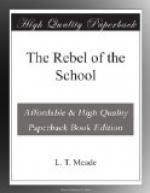“Right or wrong, I mean to enjoy myself,” said Susy Hopkins. “I suppose, if you come to analyse it, it is wrong, and not right. But, dear me, Ruth! what fun should we poor girls have if we were too particular on these points?”
“It always seems to me that it is worth while to do right,” said Ruth.
“So you say, but I don’t quite agree with you. You will come to-night, in any case, won’t you?”
“Yes, I will come to-night; but I am not happy about it, and I wish Kathleen—Oh, I know it is very fascinating, and Kathleen is just delightful, but I should not like our teachers to know.”
“Of course not,” said Susy, staring at her. “They’d soon put a stop to it.”
“Are you certain? I know so little about the school.”
“Certain? I’m convinced. Why, they’d be furious. I expect we’d be expelled.”
“Then that proves it. I didn’t know there was any strict rule about it.”
“Why, what are you made of, Ruth Craven?”
“I thought,” said Ruth, “that when we were not in school we were our own mistresses.”
“To a certain extent, of course; but we have what is called the school character to keep up. We have, as it were, to uphold the spirit of the school. Now the spirit of the school is quite against secrecy in any form. Oh dear, why will you drag all this out of me? I’d made up my mind not to think of it, and now you have forced me to say it. Of course you will come to-night. You have to think of Kathleen as well as the school, and she’s gone to a fearful lot of expense. You could not by any possibility forsake her, could you?”
“No, of course not,” said Ruth very slowly.
She bade Susy good-bye and walked on; her attitude was that of one who was thinking hard.
“Ruth is very pretty,” said Susy to herself, “but I don’t know that I quite admire her. She is the sort of girl that everybody loves, and I am not one to admire a universal favorite. She is frightfully, tiresomely good, and she’s just too pretty; and she’s not a bit vain, and she’s not a bit puffed up. Oh, she is just right in every way, and yet I feel that I hate her. She has got the sort of conscience that will worry our queen to distraction. Still, once she joins she’ll have to obey our rules, and I expect our queen will make them somewhat stringent.”
A clock from a neighboring church struck the half-hour. Susy looked up, uttered an exclamation, put wings to her feet, and ran the rest of the way home. Susy’s home was in the High Street of the little town of Merrifield. Her mother kept a fairly flourishing stationer’s shop, in one part of which was a post-office. Some ladies were buying stamps as Susy dashed through the shop on her way to the family rooms at the back. Mrs. Hopkins was selling stationery to a couple of boys; she looked up as her daughter entered. Susy went into the parlor, where tea was laid on the table. It consisted of a stale loaf, some indifferent butter, and a little jam. The tea, in a pewter teapot, was weak; the milk was sky-blue, and the jug that held it was cracked.




